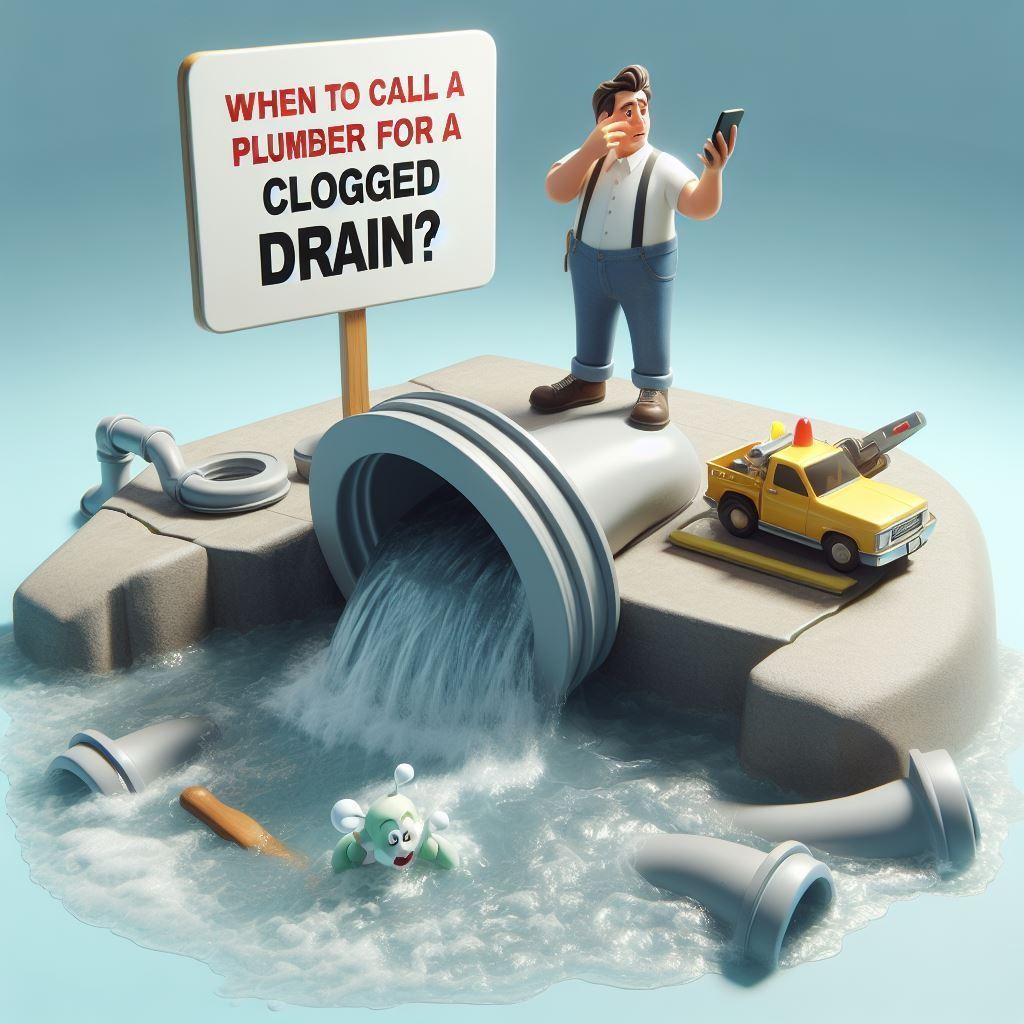Clogged drains are a common household issue that can cause frustration, inconvenience, and potential damage if left unaddressed. While some clogs may seem minor and can be tackled with DIY methods, there are situations when it’s advisable to call in a professional plumber. Knowing when to seek expert help can save you time, and money, and prevent further complications down the line.
Table of Contents
ToggleSigns That You Need to Call a Plumber
Before attempting any DIY solutions, it’s essential to assess the severity of the clog and identify potential warning signs that indicate the need for professional assistance. Here are some telltale signs that it’s time to call a plumber:
- Multiple Clogged Drains: If you’re experiencing clogs in more than one drain, it could indicate a more significant blockage in the main sewer line or a problem with your plumbing system. Attempting DIY solutions may only provide temporary relief, while a plumber can identify and address the underlying issue.
- Slow Draining Sinks and Tubs: While a slow drain may not seem like a major concern initially, it can be a sign of a partial clog that’s gradually worsening. If left unaddressed, it can lead to complete blockages and potential backups.
- Gurgling Sounds: If you hear gurgling or bubbling sounds coming from your drains, it could signify a blockage in the vent stack or main sewer line. These sounds are often caused by air pressure buildup due to restricted water flow.
- Water Backup: If water starts backing up into sinks, tubs, or other fixtures, it’s a clear indication of a severe clog that requires immediate professional attention. Attempting to unclog the drain yourself could result in a messy and potentially hazardous situation.
- Foul Odors: Strong, unpleasant odors emanating from your drains can be a sign of a clog caused by organic matter, such as food particles or sewage, which can be difficult and unsanitary to remove without proper tools and expertise.
- Recurring Clogs: If you find yourself dealing with recurring clogs in the same drain despite using over-the-counter drain cleaners or DIY methods, there’s likely a more significant underlying issue that requires professional assessment and resolution.
When DIY Solutions Aren’t Enough
While there are various DIY methods for unclogging drains, such as using plungers, baking soda, vinegar mixtures, or over-the-counter drain cleaners, these solutions may not be effective in certain situations. Here are some instances when DIY methods may fall short, and calling a plumber is the better option:
- Stubborn or Severe Clogs: If you’ve tried multiple DIY methods without success, it’s likely that the clog is too severe or deeply rooted for DIY solutions to work effectively. Attempting to force the issue can potentially cause further damage or create a bigger mess.
- Clogs in Main Sewer Lines: Clogs in the main sewer line require specialized equipment and expertise to locate and clear the blockage. DIY methods are often ineffective and can even exacerbate the problem by pushing the clog further down the line.
- Clogs Caused by Tree Roots: Tree roots can infiltrate and damage sewer lines, causing stubborn clogs that are difficult to clear without professional equipment like hydro-jetters or cable machines.
- Clogs in Older Homes: Older homes may have outdated or deteriorating plumbing systems that are more prone to clogs and blockages. DIY solutions may provide temporary relief, but a plumber can assess the condition of the pipes and recommend appropriate solutions.
- Clogs in Commercial or Industrial Settings: Commercial and industrial buildings often have more complex plumbing systems that require specialized knowledge and equipment to address clogs effectively.
Benefits of Calling a Professional Plumber
While DIY methods can be tempting for their perceived cost-savings, calling a professional plumber offers several advantages that can save you time, and money, and prevent further complications:
- Proper Diagnosis and Solutions: Experienced plumbers have the knowledge and tools to accurately diagnose the root cause of the clog and recommend the most appropriate solution, whether it’s hydro-jetting, cable machine snaking, or pipe replacement.
- Advanced Equipment and Techniques: Plumbers have access to specialized equipment and techniques, such as video camera inspections, that can locate and clear even the most stubborn clogs without causing damage to your pipes.
- Safety and Liability: Attempting to unclog drains yourself can be hazardous, especially if dealing with sewage backups or harsh chemical drain cleaners. Professional plumbers are trained in proper safety protocols and are insured, protecting you from potential liabilities.
- Long-Term Solutions: Plumbers can identify underlying issues, such as pipe bellies, root intrusions, or improper installations, and provide long-term solutions to prevent recurring clogs.
- Time and Hassle Savings: While DIY methods can be time-consuming and frustrating, hiring a professional plumber can save you valuable time and effort, ensuring the job is done efficiently and effectively.
When to Call a Plumber for Specific Drain Types
Different types of drains may require different approaches and levels of expertise. Here’s a guide on when to call a plumber for specific drain types:
- Kitchen Sink Drains: If you’ve tried using a plunger, baking soda vinegar, or a drain snake without success, it’s time to call a plumber. Kitchen sink drains can often become clogged with stubborn food particles, grease, and debris that require professional attention.
- Bathroom Sink and Tub Drains: For clogs in bathroom sinks and tubs, DIY methods like using a plunger or drain cleaner may be effective for minor clogs. However, if the clog persists or involves hair buildup, it’s advisable to call a plumber to prevent further issues.
- Toilet Drains: Toilet clogs can be particularly challenging and messy to handle on your own. If a plunger doesn’t clear the clog, it’s best to call a plumber, as they have specialized tools and techniques to safely and effectively unclog toilet drains.
- Floor Drains: Floor drains in basements, garages, or laundry rooms can become clogged with debris, dirt, or even tree roots. If DIY methods fail to clear the clog, a plumber may need to use specialized equipment like hydro-jetters or camera inspections to locate and clear the obstruction.
- Main Sewer Lines: As mentioned earlier, clogs in the main sewer line should always be handled by a professional plumber. Attempting DIY solutions can cause further damage or push the clog deeper into the system, leading to more extensive and costly repairs.
Preventative Maintenance and Drain Care
While calling a plumber for severe clogs is necessary, practicing proper drain care and preventative maintenance can help minimize the likelihood of clogs occurring in the first place:
- Use Drain Covers: Installing drain covers or hair catchers in showers, tubs, and sinks can prevent hair, soap scum, and other debris from entering and accumulating in the drains.
- Avoid Pouring Grease or Oils Down Drains: Grease and oils can solidify and contribute to clogs, especially in kitchen sink drains. Instead, dispose of them properly or consider installing a grease trap.
- Regular Drain Cleaning: Periodically using baking soda and vinegar or enzymatic drain cleaners can help break down organic matter and keep drains clear.
- Avoid Chemical Drain Cleaners: While chemical drain cleaners may seem effective in the short term, they can be harsh on pipes and potentially cause damage over time. It’s generally better to opt for safer, more environmentally friendly solutions or seek professional assistance.
- Schedule Professional Maintenance: Having a plumber perform regular maintenance checks and hydro-jetting services can help prevent clogs before they occur and identify potential issues early on.
By understanding when to call a plumber for a clogged drain, you can avoid unnecessary frustration, potential damage, and costly repairs down the line. While DIY methods can be effective for minor clogs, it’s crucial to recognize the signs that indicate the need for professional assistance. Remember, addressing clogs promptly and appropriately can save you time, and money, and ensure the proper functioning of your plumbing system.

